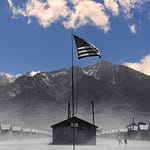This will be the last story in my short story collection, Corvairs and Horny Toads. I saved it for last because it’s an early draft of a story, and it’s unfinished. And it means a great deal to me.
I’ll still be creating content on Substack. Please stay onboard to see what’s next.
Before I share this last story, I want to thank you, my listeners and readers. Thank you for letting me take you to so many places in my imagination, in my mother and father and other family members’ memories. Cookie crumbs of those memories are scattered throughout the short stories I’ve written. These stories were important to me because I wanted to recapture a particular time when my parents and I were together. I wanted to paint a picture of a small town on the High Plains—much like the one that shaped us—and introduce some inhabitants that were very much like the people I grew up around. It has been a joy for me to conjure the world of Dixon and to share its stories and its characters with you.
And it has been more, too—these stories opened a door for my mother which opened the door for me to imagine the stories that would become Corvairs and Horny Toads.
One day several years ago, my mother said, “I had an unhappy childhood.” It was a blunt explanation to me for why she didn’t want to dig into the past. I knew things about her life growing up, but she had painted the story in broad strokes, leaving out details. When I pressed her for details, she would either say she couldn’t remember or sometimes—often—she would become angry and upset. I knew that at just 14, she’d lost her mother. I couldn’t imagine such loss. My mother’s childhood was not only filled with pain, it was cut shockingly short.
A decade later my parents built their first home, a small 2-bedroom, 1-bath, and it was to that house they brought me—the baby they had wanted for such a long time. But it wasn’t just the three of us for long. Just seven months later, my mother and father gained custody of Mama’s sisters, and we all squeezed into the little house. It bulged at the seams with love.
I can’t imagine the difficulty and pain of a custody battle between a daughter and a father, my mother and my grandfather. I don’t know how she bore it. But the woman my grandfather married was cruel, and Mama would not stand by and let her sisters endure it. That Mama would not dredge up those memories and others is understandable. Perhaps that was how she managed to survive and persevere when many would have crumbled.
But there were other things I wanted to know, things that had fallen victim to Mama’s repressed memory. So, I coaxed and cajoled, trying to get her to remember things for me so that I could remember things for her. Maybe I should not have. People create defense mechanisms to defend themselves from pain. But it was through this collection of short stories that Mama and I got beyond so much of her childhood trauma. We managed to reframe it through these fictional stories.
Mama always wanted me to write. She encouraged me for years and kept on persuading me to write more, not unlike how I tried to persuade her to remember more.
By accident, I wrote a short story about a family that lived in a small town very much like the one where Mama and I both grew up. I read it to her, of course. She was hooked. Then I wrote another one—same town, characters similar to people we knew all our lives. And then I wrote another…
Mama was so enthused, she began to remember and happily share her memories with me. Many of those memories found their way into my stories, and Mama was the first to hear each story. These stories were a labor of true love between me and her.
I bounced off story ideas with her, discussed characters. She and I remembered what it was like to grow up in such a small town. We talked a lot about the character of Dixon itself. So, when I began to write this story, Little Vera Sharp, and I wanted to dig into a particularly difficult social issue, my question of whether or not to take the town in a dark direction was something Mama and I discussed. If I gave Dixon a dark secret past, how was I going to redeem it—this little town we’d both grown to love? I posed these questions to Mama…
The spring of 2023 came around, then the month of April. Our time together was growing short. I stayed next to her in bed or in a chair beside her, talking to her constantly. Could there possibly be anything I hadn’t told her, any words I hadn’t spoken to her, anything I wanted to say to my precious mother that I hadn’t said before? I don’t think there was anything left unsaid between us. Still, I talked and talked, and I wrote. I wanted to finish this story. I wanted to read it to her. I wanted us both to know how it turned out.
On a day close to the 5th of April, our time together was so close to gone, I knew I had to read the story to her, even though it wasn’t quite finished and Dixon had not been redeemed yet. So, lying next to her, I read her this story…
Little Vera Sharp was frantically running catty-corner across the wide Main Street from the drug store carrying a white paper sack. Inside it was a prescription for her mother, who had been bad sick for over a week with a burning fever and a deep wracking cough. Her lungs were like the billows of an accordion, issuing discordant wheezing sounds in and out. When she wasn’t burning up, she was beset by chills so bad her shaking rattled the iron bedstead where she lay with layer upon layer of blankets and quilts.
It was almost 6:00pm when Dr. Willis knocked on the screen door, then ventured into the front room of the tiny house that smelled of fried bacon. Little Vera had been to his office three times in the last week begging for help. Finally, he came to the house and after a summary examination, the doctor scribbled on a pad, tore off a sheet and handed it to the woman’s youngest child with the warning that she’d better run, it’d be dark soon.
It wasn’t her size that earned Little Vera her name. Loretta Sharp’s firstborn child had been a stillborn baby girl she’d named after her mother Vera. When Loretta gave birth to her last child, she labored for a day and a half, at times crying and calling out for her mother. At last, when the midwife placed a strong baby girl in her arms, Loretta whispered, “It’s my little girl, Mama. My little Vera come back to me.” And so, the child was named Little Vera Sharp. And Loretta pinned her hopes onto the little girl—every hope and dream she’d ever had. And Little Vera, with the sweetest grace, had borne the responsibility of bringing her mother joy and fulfilling her hopes. For eight years now, Loretta and Little Vera had been inseparable.
Little Vera was born kind and wise, knowing of the world long before she’d seen any of it outside of Dixon. She was a happy child, too. But she had inherited her mother’s dread and fear of loss. Something bad had happened to Little Vera’s daddy when she was barely three years old. Something Loretta never talked about. Little Vera didn’t dare ask because she’d been awakened many times to the sound of her mother crying late in the night and, young as she was, she knew her mother was crying for her daddy.
So, when Loretta became ill, Little Vera was frantic to do whatever she could to help her. For days, she tried to bring down her fever, warm her when she shook with chills, feed her sips of sweet hot tea, try to persuade her to eat the fluffy biscuits she’d already learned to duplicate after watching her mother’s quick hands dip into the big sack that held flour and, when empty, would become the soft cotton fabric Loretta would use to make floral-patterned dresses and matching panties for her to wear to church and school.
Loretta was always busy. She did whatever she needed to do to hold her family together—take care of her three children, Arthur Lee, her oldest, Simon, the middle child, and Little Vera. She made six pies a day for Pearl’s Boarding House and three layer cakes a week—German Chocolate for Pearl’s and two banana cakes with caramel icing—for the snack bar at Beal County Hospital. There were people in Dixon who stopped by the hospital whether they had anyone there to visit or not just so they could get a slice of Loretta’s banana cake, it was that good. She took in ironing, too, and she did the books for Pastor Vaughn—but she refused to take any money for that, said it was for the Good Lord. She never missed church or choir practice.
Loretta was always singing. Outside the open kitchen window, if they were chopping wood or swinging on the old inner tube that hung from a giant elm tree, Arthur Lee and Simon could hear her singing while she taught Little Vera to cook. “When the trumpet of the Lord shall sound and time shall be no more—now cup your hand and put in a pinch of salt and a little of that baking powder, now put that in with your flour and stir it around some, mmm hmm…and the morning breaks eternal bright and fair. When the saved of earth shall gather over on the other shore…now scoop out a good bit of lard and work it in with your fingers, add some milk and mix that up, just ‘til it holds together…when the roll is called up yonder—that’s good. Now always flour your jelly glass before you cut ‘em out—easy as that. When the roll is called up yonder I’ll be there.” Loretta would fill a big pan with the raw biscuits—“enough to feed Coxey’s army,” she’d say—and the result when they came out of her wood stove were tall, light-as-air biscuits that, when their aroma mixed with the rich smell of coffee and fried bacon, called her kids to crowd around the kitchen table and wait their turn to ladle steaming cream gravy over the hot biscuits or split them open, put hunks of butter that melted and dripped down the sides, then plop heaping spoons of dark apple butter on top.
Her children’s enthusiasm for food pleased Loretta to her core. With their mouths full and jaws working, the kids would plead with her, saying, “Come on, Mama, eat”—pleas that she often waved off as she went about washing up, waiting until they’d had their fill before she sopped up what, if any, scraps they’d left. She had always managed to put food on the table for her kids, but it didn’t always include enough for herself. But Loretta Sharp managed to raise her children and instill goodness and virtue and integrity in them—all in Dixon, where she had been born and raised.
But Dixon, the little town with its big, friendly heart, had a dark failing that applied to a small percentage of the population—a dark, generations-deep, shameful failing. It would take Little Vera Sharp to change it, and she would have some help along the way.
Dixon, for all its goodness and open-armed hospitality, harbored a secret. Well, it managed to be a secret to some. To some, it was something to be kept tucked away in a category titled “Denial,” but to others, it was an open declaration of discrimination. Dixon’s population had a single-digit percentage of black citizens, and that was not by accident. As with many so-called Sundown Towns, the malevolent rules and tenets of it were clearly understood by those to whom the rules applied.
In some cities, the rules included Jews, some cities, Mexicans, or Irish, or Italians, Chinese, Japanese or all of the above. It even applied to the Native People upon whose ancestral land the entire United States of America spread. Any group of people that fell into the arbitrary and unfortunate category of “less than” was subject to it. Sundown Towns abounded. And these unholy attitudes and policies were not relegated to the stereotypically portrayed, racially prejudiced Deep South. In truth, the majority of Sundown Towns were located outside the South. Sometimes, the policies were overt, with no attempt made to cover up the ugliness. In others, like Dixon where it applied to the African American population, it was more subtle—if the term can be applied to such a cruel practice—but let there be no doubt Dixon’s black residents knew that come sundown, they’d better be off the streets.
And that is why on that day when her mother was so sick and in need of medicine, Little Vera was running as fast as her legs could carry her, zigzagging across streets and jumping fences and, at last, the bar ditch that ran along in front of her small house to get home before darkness fell. She reached her house, fearful and panting. The screen door slammed behind her with a sharp crack as she ran to the kitchen sink, filled a glass with water and rushed to Loretta’s side. She poured out one of the pretty two-toned capsules that would finally restore her mother to wellness.
Priscilla Gibson and Little Vera Sharp were classmates and had formed a bond in the second grade when they discovered a shared interest in rocks. It was recess, and Priscilla was busy in a section of the playground apart from where playground equipment was arranged. Priscilla dearly loved swings, but she preferred her own swingset at home to the monstrosity on the playground that surprisingly accommodated a measly six swings. It was made up of long metal poles set at angles that were engineered to support the furious back-and-forths of the swings that were attached by huge hooks to the long pole at the top that spanned easily 20 feet. The teachers had to impose strict time limits to allow each child to have a turn and frequently had to break up tugs of war between kids over a coveted swing. Priscilla did not like tussles, so she avoided the swings entirely.
But the slide was too much fun to resist. She would run first thing to the tall, daunting slide, squinting as she ran to avoid the reflected sunlight that glinted from the long silver chute, get in line and wait her turn to climb the many steps that ascended to the top. It was scary and dangerous, too. One day, Freddie Gonzales fell off—because he was horsing around, Miss Tilford said—and broke his arm. He had to wear a cast for what seemed like months. By the time he got the cast off, the plaster had turned from white to almost brown—plumb filthy from weeks of his horsing around. Ascending the steep steps of the slide, each kid hung tightly to the rails that ran alongside—if they knew what was good for them, of course—which did not include horsing around.
Priscilla clutched so tightly to the metal rails, the smell of metal clung to her hands until she’d washed them off. At the top of the slide, she liked to linger for as long as she could, looking across the playground and beyond the schoolgrounds because she could see all the way to the big water tower that was just a block down the street from her house on Avenue C. For those moments at the top, she felt a kind of euphoria being so much closer to the sky. Then seconds later, the thrilling and almost horrifying ride down the silver chute would deposit her back to earth, feet dangling above the deep depression in the dirt at the bottom. Each kid jumped into the depression and raced fast as ever they could back to the ladder to go again. But often after just one turn, Priscilla liked to get busy building a house in that section apart from the swings and slide and monkey bars.
Her houses resembled real facsimiles of a blueprinted floorplan because she used rocks to create only the lines of the rooms. She was partial to a floor plan similar to the house where she lived that included a formal living room smaller than the den-and-kitchen combination that she believed was most practical. She preferred a 3-bedroom scheme with two bathrooms, but it took some doing to get a house that big finished before the bell rang, so sometimes she settled for the modest 2-bedroom, 1-bath model, and when the house was finished, well that was pretty much it. She liked to walk through the rooms and imagine the walls going up, sheetrock and paneling being installed, kitchen cabinets, paint. But most of all, she liked the days when a dust devil would corkscrew across the playground and head toward the house like the tornado in “The Wizard of Oz,” and she would flee to the safety of the seesaw pretending to carry a small terrier in her arms, protecting it from the storm as the wind stung her legs with dirt and gravel. Then, she would imagine singing “Somewhere Over the Rainbow,” but not actually sing it because her singing could never be as good as Judy Garland’s, and she didn’t want to embarrass herself.
Anyway, it was on a day like that that Little Vera asked if she could help Priscilla build a house. Little Vera had sourced some interesting rocks from a remote corner of the playground that Priscilla had missed, and when they were added to the boring white caliche rocks she was accustomed to using, made a distinct aesthetic improvement. Little Vera had a keen interest in rocks more than houses, but she needed to put her building supplies to use, so it was a good partnership between the two little girls.
But there came a day when Priscilla got wind of an evil that hit her deep in the pit of her stomach like she’d been pummeled by one of the rocks, and, like a stone, the heaviness of it embedded itself in her gut, and she carried it there, silently afraid to ask for an explanation from Little Vera for her inexplicable behavior. It was when tall, angry thunderhead clouds appeared out of nowhere in the blue sky and cast a sudden darkness across the playground that Priscilla witnessed Little Vera’s visceral reaction and her frenzy to reach the rocks that outlined the house they’d built that day. Priscilla’s playmate had leaped over the outline that represented a wall and crouched in a corner of one of the rooms, refusing to leave even when the recess bell rang. Miss Tilford had to drag her across a wide stretch of playground back to the corridor that led to the bathrooms where she wiped Little Vera’s face, making the lines disappear—lines that had been formed by her tears and made little riverbeds through a layer of dust that covered her cheeks.
Priscilla demanded to know what was wrong. The explanation she got from Miss Tilford was evasive, clearly false and, worse, it was dismissive of what Priscilla had just witnessed—trauma experienced by her friend. It made her feel sick. She ran into a stall and threw up her lunch of fish sticks and tater tots.
The girls never spoke of it. But when Priscilla got home that afternoon, she pursued it again, determined to know why a sudden darkening of the sky had made her friend run to the safety of a pretend house. Ike and Jerry Dale knew they had to find a way to answer their little girl’s insistent questions—answer a question their adult minds could not fathom or justify a truth that was ugly and hateful and should not have to be learned by a child. Ike disappeared around the side of the house to think. He sat on his haunches smoking cigarettes, flicking the butts alongside the house next to a damp spot where water dripped from a stubbornly leaky faucet where he attached his water hose—the hose he used to hand-water the plush grass he’d planted for Priscilla to play on, the hose he used to fill her wading pool where she used to squeal and kick the water when she was a baby, the hose he held for her to take deep, clandestine drinks from because Jerry Dale swore it was unsanitary. The dampness in that spot nurtured an unruly stand of spearmint that emitted a pleasing aroma. Jerry Dale liked to add a leaf of it to a glass of iced tea.
Ike and Jerry Dale had built a good life, but each of them had memories from childhood that were best forgotten. For Ike, Priscilla’s questioning had brought bitter memories to mind of his childhood and the Sundown Town rules that plagued him when he was growing up in Oklahoma. The bitter irony that there were Oklahoma towns—places his grandmother and grandfather had been forced to call home after being driven from their ancestral homes—towns that had rules that kept the little half-Indian, half-white boy out of certain businesses. And some of the towns had signs at the city limits warning Indians to be out by dark. Ike had felt shame and humiliation and anger he never spoke about, never told Jerry Dale about, was loathe to tell his only child about—his little girl who carried his Indian blood as well as her mother’s white blood. The child whose demand to know the truth was not going to go away. It made his stomach turn inside out.
That sentence about Ike Gibson, based on my daddy, is the last sentence I ever wrote and read to Mama. Later, I thought about finishing the story, I wrote a bit more, but with Mama gone I didn’t have the heart to finish it.
So, I’ll leave off there, leave you with the unfinished story. I told Mama how it would end—an ending that satisfied us both. I’ll let you decide what happens to Little Vera and how she is part of the redemption of Dixon.
About Dixon, the little town perched atop the Llano Estacado. Years went by. Decades. The Wind blew. Layer after layer of sand and dirt eroded and, with it, much of the shameful past. The darkness was held up to the light and was washed as clean as the vistas that spread out on the High Plains.
Thank you again for letting me share these stories with you. Thank you for reading and listening to Corvairs and Horny Toads and for all the kindness and support you’ve given me. Thank you for reaching out and telling me how the stories touched you. That has meant the world to me.
Thank you to Alan, who produced Corvairs and Horny Toads perfectly.
And thank you, Mama, for being the reason I created the world of Dixon and for being the reason I’m here.
Happy Mother’s Day.














Share this post